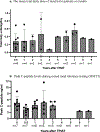Longitudinal Quality of Life and Glycemic Outcomes of Total Pancreatectomy With Islet Autotransplantation in Children With Chronic Pancreatitis Followed in a Pediatric Multidisciplinary Pancreas Clinic
- PMID: 38895780
- PMCID: PMC12081837
- DOI: 10.1111/petr.14813
Longitudinal Quality of Life and Glycemic Outcomes of Total Pancreatectomy With Islet Autotransplantation in Children With Chronic Pancreatitis Followed in a Pediatric Multidisciplinary Pancreas Clinic
Abstract
Background: Total pancreatectomy with islet autotransplantation (TPIAT) is a potentially curative treatment for patients with chronic pancreatitis (CP) refractory to medical and endoscopic therapies. Patients often receive the initial follow-up medical care at the surgery-performing center, but then may follow up closer to where they live. We sought to describe the characteristics and outcomes of pediatric patients who underwent TPIAT at a national surgical referral center and were subsequently followed at our regional subspecialty center, the Children's Hospital Colorado.
Methods: We performed a retrospective analysis of baseline and outcomes data for the 10 pediatric patients who underwent TPIAT from 2007 to 2020 and received follow-up care at our institution.
Results: All patients had a diagnosis of CP, and nine of 10 patients had an identified underlying genetic risk factor. Insulin usage was common immediately following TPIAT, but at 1 year of follow-up, five of nine patients (55.6%) were insulin-independent and nine of nine had an HbA1c below 6.5%. For the four patients on insulin 1 year after TPIAT, total daily insulin dose ranged from 0.06 to 0.71 units/kg/day. All patients who underwent mixed meal tolerance testing had a robust peak C-peptide response at 1 year. There were significant improvements in nausea, school/work absences, narcotic dependence, and pancreas-related hospital admissions 1 year after TPIAT.
Conclusions: Patients followed at our center had long-term improvements with low-insulin usage, detectable C-peptide, and improved pancreatitis-related outcomes after TPIAT. Pediatric patients who undergo TPIAT can be successfully co-managed in conjunction with the original surgery-performing center.
Keywords: TPIAT; islet transplantation; pancreatic surgery; pediatric diabetes; pediatric pancreatitis.
© 2024 Wiley Periodicals LLC.
Conflict of interest statement
Figures


Similar articles
-
Implementation of a nationwide program for total pancreatectomy and islet autotransplantation in chronic pancreatitis: A Scandinavian single-center observational study.Scand J Surg. 2025 Jun;114(2):174-182. doi: 10.1177/14574969241298985. Epub 2024 Nov 18. Scand J Surg. 2025. PMID: 39558154
-
Total pancreatectomy with islet autotransplantation outcomes in patients with pancreatitis of genetic etiology: A single-center experience with a large cohort of patients.J Gastrointest Surg. 2024 Aug;28(8):1309-1318. doi: 10.1016/j.gassur.2024.05.034. Epub 2024 Jun 2. J Gastrointest Surg. 2024. PMID: 38834105
-
Minimally invasive total pancreatectomy with islet autotransplantation for chronic pancreatitis: the robotic approach.Surg Endosc. 2024 Jul;38(7):3948-3956. doi: 10.1007/s00464-024-10904-w. Epub 2024 Jun 6. Surg Endosc. 2024. PMID: 38844730
-
Glycemic Outcomes of Islet Autotransplantation.Curr Diab Rep. 2018 Sep 28;18(11):116. doi: 10.1007/s11892-018-1095-0. Curr Diab Rep. 2018. PMID: 30267202 Review.
-
Pediatric pancreas transplantation, including total pancreatectomy with islet autotransplantation.Semin Pediatr Surg. 2017 Aug;26(4):250-256. doi: 10.1053/j.sempedsurg.2017.07.004. Epub 2017 Jul 25. Semin Pediatr Surg. 2017. PMID: 28964481 Review.
References
MeSH terms
Substances
Grants and funding
LinkOut - more resources
Full Text Sources
Medical
Miscellaneous

